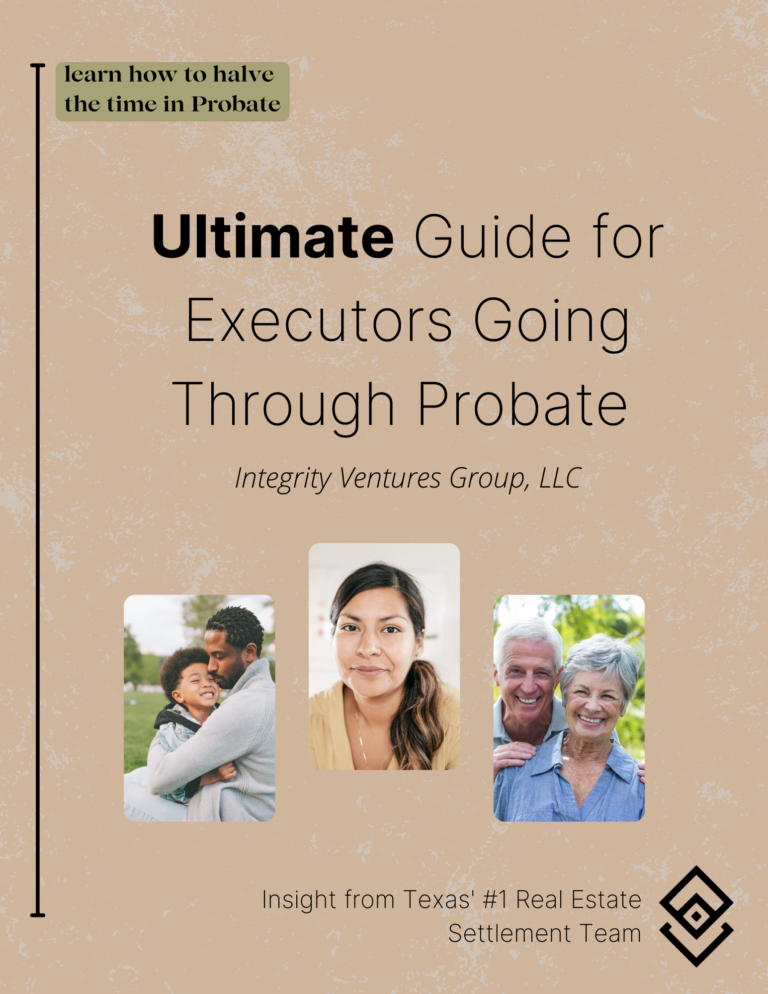do you want to cut your probate Process time in half?
Probate Independent vs Dependent Administration in Texas: An Educational Overview
disclaimer
Integrity Ventures Group asserts that it is not a licensed lawyer, and this article is intended solely for providing general guidance and information, and should not be considered as legal advice or a substitute for consulting with a qualified attorney. For any specific legal grievances related to personal probate cases, we strongly advise individuals to seek professional legal counsel and engage the services of a licensed attorney.
At Integrity Ventures Group, we pride ourselves on being the premier estate settlement firm in Texas. Our expertise lies in assisting families daily, helping them unravel the complexities of their probate proceedings alongside their attorneys. We would be honored to extend our knowledge to help guide you through your unique journey as well. Let’s Dive into: the independent vs dependent administration of probate in Texas.
Introduction
Probate is a subject that most people prefer to avoid until it becomes unavoidable. When a loved one passes away, understanding the intricacies of probate law becomes an immediate concern. One of the complexities surrounding the Texas probate process involves choosing between Independent and Dependent Administration. While these terms may sound complicated, understanding their differences is essential for navigating the probate process effectively. This guide aims to provide an in-depth educational overview of Independent and Dependent Administration in Texas probate.
Table of Contents
- Understanding Probate
- Probate Administration: The Basics
- Independent Administration
- Dependent Administration
- Pros and Cons
- Choosing Between Independent and Dependent Administration
- Common Questions
- Conclusion
Understanding Probate: What It Is and Why It Matters
Probate is the judicial process to validate a deceased individual’s will and administer their estate, ensuring that debts are paid, and assets are distributed according to the will or state law. Given the financial and emotional weight of this process, understanding the basics of probate administration can be invaluable.
Probate Administration: The Basics
Once a will is validated, the next step is administration, overseen by an executor (if there’s a will) or an administrator (if there’s no will). In Texas, you have the choice of two types of administration: Independent and Dependent.
Independent Administration in Texas: A Flexible Approach -What Is It?
In Independent Administration, the executor manages and settles the estate without court supervision. This system streamlines the process, making it less time-consuming and costly.
How Does It Work?
- Executor Appointment: The court appoints the executor named in the will.
- Inventory Submission: Within 90 days, the executor must file an inventory of estate assets.
- Debt Settlement: The executor pays off debts, starting with secured debts and moving to unsecured ones.
- Asset Distribution: After settling debts, the remaining assets are distributed to beneficiaries.
Who Is Eligible?
- The will must specify or allow for independent administration.
- All beneficiaries must agree to it.

Dependent Administration in Texas: A Court Overseen Process
What Is It?
Dependent Administration is the opposite of its independent counterpart. Here, the executor or administrator is required to get court approval for almost every action, from selling estate property to paying off debts.
How Does It Work?
- Executor or Administrator Appointment: Court appointment after a rigorous validation process.
- Frequent Court Filings: The administrator must file for court approvals regularly, detailing their actions.
- Asset Distribution: Only after court approval can assets be distributed to the beneficiaries.
Who Is It For?
- Estates with a lot of debt.
- When beneficiaries do not trust each other or the executor.
Pros and Cons of Independent vs Dependent Administration
Independent Administration
Pros:
- Faster Process
- Less Expensive
- Greater Control for Executor
Cons:
- Potential for Mismanagement
- Less Oversight
Dependent Administration
Pros:
- More Oversight
- Beneficiary Protection
Cons:
- Time-Consuming
- Costly due to Court and Attorney Fees
Choosing Between Independent and Dependent Administration
Your choice should depend on various factors such as:
- Estate Complexity: Larger, more complex estates may benefit from the rigorous oversight of dependent administration.
- Family Dynamics: If family members get along and trust the executor, independent administration can be a more convenient choice.
- Debt Levels: High levels of debt may require the oversight provided by dependent administration.
Common Questions About Independent and Dependent Administration
Can I switch from Dependent to Independent Administration?
- Yes, but all beneficiaries and the court must agree.
What if there’s no will?
- Texas law provides a preference for Independent Administration but it’s not guaranteed.
Is court supervision really that rigorous in Dependent Administration?
- Yes, expect close scrutiny for each action you take as an executor or administrator.
Conclusion
When it comes to probating an estate in Texas, the choice between Independent and Dependent Administration is one of the most critical decisions you’ll make. The ideal choice varies depending on the estate’s complexity, family relationships, and levels of debt. A thorough understanding of each type of administration can greatly alleviate the stress involved in what is often an emotionally charged process.
Understanding the distinctions between Independent and Dependent Administration could save you time, money, and emotional energy. Your loved one’s final wishes are an important responsibility, so knowing which form of probate administration best suits their estate can help you honor their legacy in the most effective and efficient manner.
FIND MORE HELPFUL ARTICLES LIKE THIS ONE
DOWNLOAD YOUR PROBATE CHECKLIST TODAY.
Become a part of the numerous executors who have already benefited from our free guide. Elevate your probate process with our complimentary probate checklist, designed to guide you step by step through the process of selling your real estate property today. Download it now and streamline your journey through probate.






